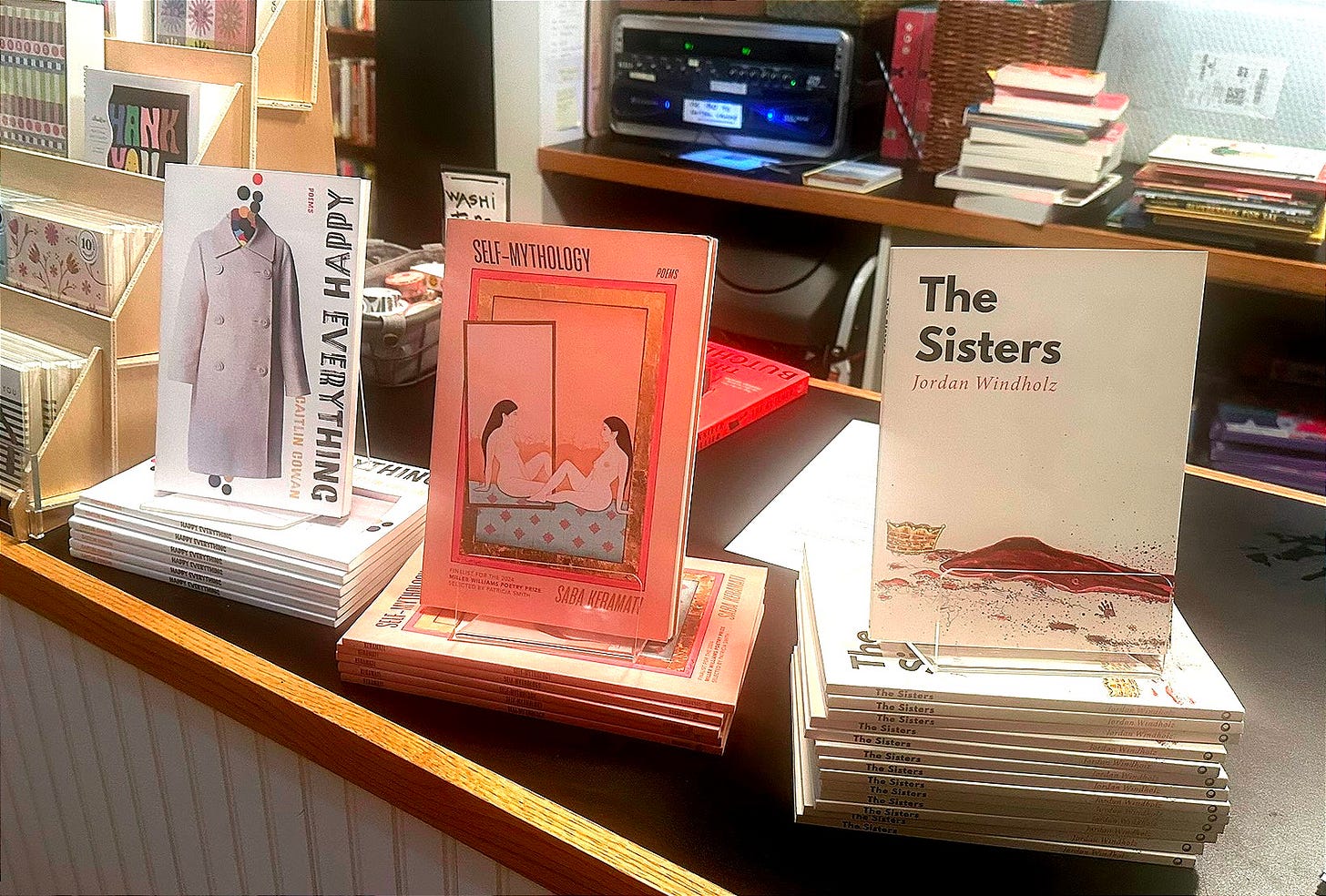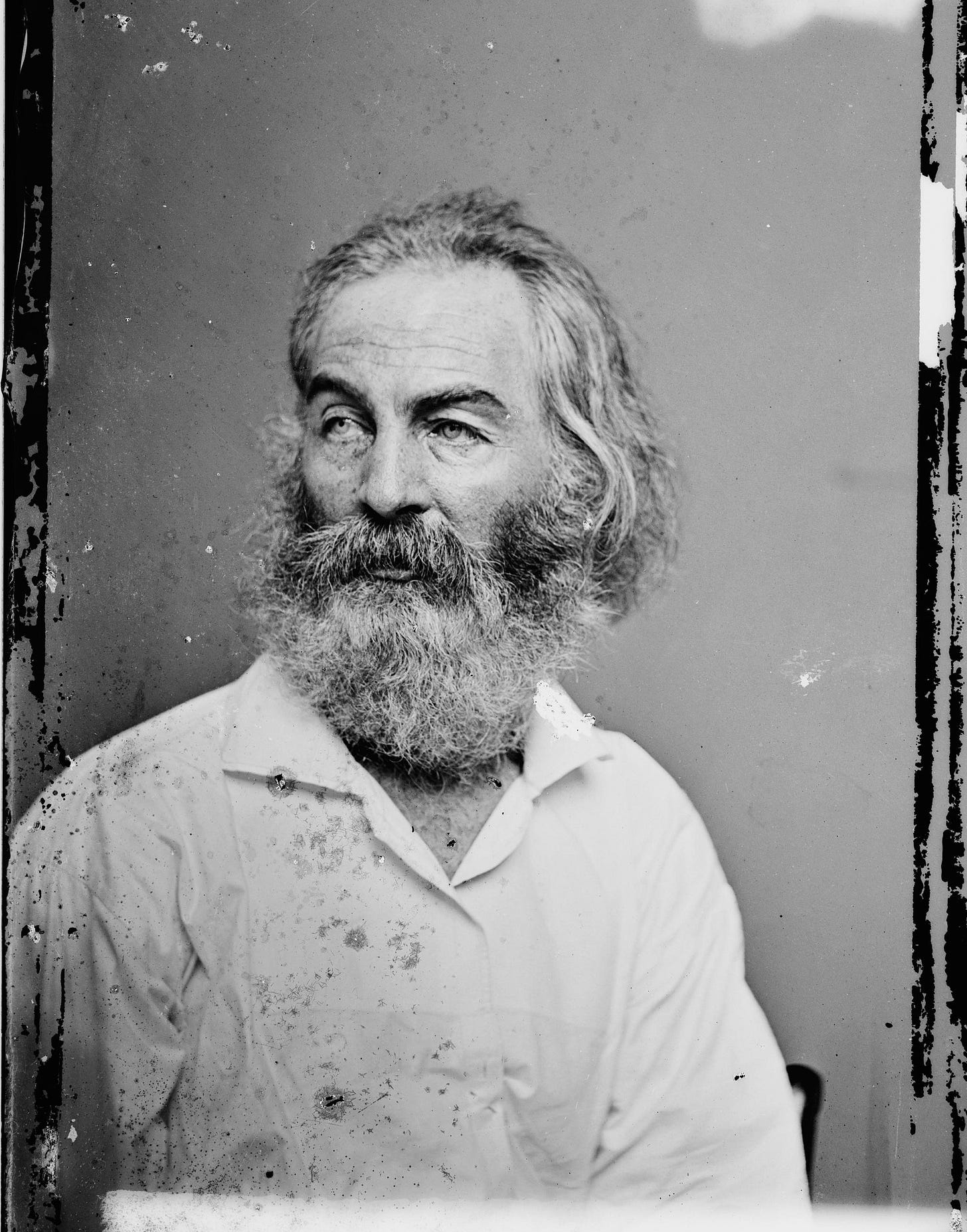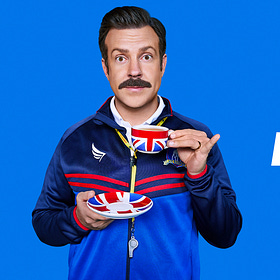What Would Walt Whitman Do?
You might not want another take on the 2024 election result, but it's my duty to write it anyway.
I purchased a bumper sticker from the Blue Earth Review table at an AWP conference several years ago. I had a poem published at BER and a former student of mine was, at that time, working for the journal. The plain green bumper sticker is emblazoned with thick white letters that ask, WHAT WOULD WALT WHITMAN DO? It’s one of my favorite bumper stickers, though I confess that I have several, including others that are niche poetry jokes. WWWWD perplexes many who encounter it, and I routinely receive comments about it from strangers. Most of these remarks are something like “Hm. Interesting!” or “That’s funny.” I’m not sure if these folks actually find it interesting or funny. Mostly, I think they apprehend it like a kind of enigma.
The day after this country elected a megalomaniac rapist who can’t string a coherent sentence together to hold its highest office, a woman in the car next to me at a red light motioned for me to roll down my window. When I did, she said, “I’ve been following you for a while now! I’ve just got to ask you, who is Walt Whitman?”
I was delighted to answer. “He was a poet!” I said, “a transcendentalist poet.” I could see the word transcendentalist shimmer over her face like a mirage; she did not quite understand. I reached for a different historical marker: “He lived around the time of the Civil War,” I said. This, she understood. The woman was appreciative of the information. Then, she asked, “So, what would he do?”
Was she asking the question more broadly, as in, What Would Walt Whitman Do More Generally on a Day-to-Day Basis? Try fitting that on a bumper sticker. Or did she mean What Would Walt Whitman Do About This Fucking Election Result? WWWWD About DJT?
What, indeed.

The day after the woman asked me about my bumper sticker, I had the pleasure, or rather, the duty of reading poetry to an audience. I had been looking forward to the event at Literati Bookstore (one of my favorites) for months. I was set to read with poets Jordan Windholz and Saba Keramati in support of Jordan’s new book, though my book and Saba’s also debuted this year. Literati, nestled in Ann Arbor, Michigan—home to my alma mater, the University of Michigan—is vocally and unabashedly committed to progressive politics and inclusion. They support local and national authors in a warm and beautiful space. I have dreamed of writing my name on their author wall for a very long time, and I visit so often that I feel right at home there.
The event organizer, Claire, introduced us to the audience and said that we three readers were going to offer them a “respite” from the events of the week (read: the election). I was the first to read. When I got to the lectern, I informed the audience that, unfortunately, I would offer them no respite. They laughed politely.
Poetry indeed is a balm and comfort, and in the days since the election, I have seen many beautiful historical and hot-off-the-press poems offered up on social media to try to affect some kind of change or comfort. But there will be no rest for the wicked and all that. Poetry comforts us, but its first allegiance has always been and always will be to the truth and to speaking that truth to power. And so I modified what might otherwise have been a more soothing reading and chose five of my most feminist and righteous poems. I do not know if the audience felt or understood them as a respite, but for 12 glorious minutes, I was able to speak some truth about the experience of being a woman in this country, in this time. In other words, I did my job.
Whitman wrote his best work at a time when the country was most divided. Democratic, expensive, he is often referred to as the grandfather of American poetry. It is canonically accepted that Whitman was also homosexual, and one me look no further than erotic allergies like “When Lilacs Last in the Dooryard Bloom’d” to understand both Whitman’s queerness and his affection for the nation and its people. In The Erotic Whitman, Vivian R. Pollak describes the “erotic complexity of Whitman’s bereavement” in this elegy to Abraham Lincoln, which also attempts to dress the “wound” in our national psyche.
Yet Whitman was a product of his time, and, as a result, pretty dense about some things, including race in America. But overall his expensive, optimistic brand of nationalism is utterly anodyne when compared to the jingoistic bullshit of Donald Trump and the assortment of unqualified hacks he has appointed to his cabinet. The sins observable in Whitman are both miniscule when compared to Americans like Trump, but at the same time they are part and parcel of the same problem. America was built on genocide, slavery, colonialism, and patriarchy; we both refuse to acknowledge those truths and are unable to shake the racism, bigotry, misogyny, and wealth inequality that are their shadows.
Is that right? Did I get it right?
What would what Whitman do? Fuck if I know. Get the hell out of here, probably, and write some really great poetry about it. But in all seriousness, I think what he would do is critique it. I think he would never shut up about it. I think he would continue to insist on a vision of America in which its sum is greater than its parts, in which many different kinds of people can be respected and valued and safe and cared for in service of a high ideal.
But what did I say to that woman who asked me to roll down my window so she could discover for herself what Whitman would do? I said love everyone. Is that right? Did I get it right?
I don’t know if I did. Perhaps what I said is more my wish than Whitman’s, and to be frank, I don’t even know how much it’s even my wish, either. I don’t want to love everyone. I don’t want to love people who don’t love everybody. There is a theory called the paradox intolerance, which means that tolerant people must be intolerant of those who are intolerant to others, otherwise the societal project of tolerance will fail. A lifetime and poetry has made my heart, already primed to be soft, extremely and incredibly porous. My soul wants to love everyone, but my brain knows that there are limits even to this. We must stand up against those who wish to create an America where only the white male elite can survive. We can’t love everyone: we have to love those who will serve the greater good, not their own personal fortune.
WWWWD? Create art that helps us see that we can be better than we are now. The “wound dresser” poet would want to help. He would help to make America a safe place for everyone to exist.
Right now, my daughter is a little more than two years old. Pretty soon, she’ll start to find out that there are things about the world that are very bad. My husband and I frequently discuss the future moment when this will happen. We know she will ask us, eventually, what we are doing about the bad bad world. And we are committed to having an answer for her.
Our family is neither wealthy nor powerful, and we live in a state that is apparently purple (Michigan barely went for Trump in the election, though it had gone to Biden 2020). I continue to search for ways to make myself useful in the fight against harmful conservative policies and rhetoric. In the past, I have engaged in letter writing, protesting, and other forms of civic engagement. But I know that what comes next is now going to require more of me, and I’m on a journey to discovering what that will be. I do know that part of my work to make a better world for my daughter and we’re all daughters for all people will involve writing. But that, quite simply, cannot be it.
I have tried to write this post for three weeks now and have finally succeeded in finishing it. I know that politics doesn’t cleanly qualify as pop culture, but it behooves me to make my stance clear, and to use my voice to stand against the oppressive kakistocracy that has taken power in the United States. If I lose subscribers to this post, so be it. If you voted for Donald Trump, this isn’t the place for you and, if you thought it was, you haven’t been reading very closely.
If you would like to envision an America where everyone—no matter their race, gender, orientation, or status—can thrive, a country more like one Whitman might have been proud of, then welcome. Welcome, and I’m glad you’re here.
If you’d like to support the work that I do here, consider becoming a paid subscriber. Every dollar enables me to write more, reach a larger audience, and do better work in the world. Thank you for considering: it’s hard to spend money on things you care about when the essentials are so costly in these tough times.
Related
Fleishman Is in Trouble Cracks a Poetic Joke
If FX’s Fleishman Is in Trouble, streaming now on Hulu, feels literary—because of Lizzy Caplan’s narration, the well-spoken yet deeply realistic characters, or its slow and expert meditation on life’s many disappointments—that’s because it’s based on a brilliant novel.
The Poem That Explains Walter White
The role that Walt Whitman’s “The Learn’d Astronomer” plays in Breaking Bad is one of the first things I ever wanted to write about for PopPoetry—seeing the work of a poet being such an integral part of the …
Ted Lasso Misquotes Walt Whitman in True Ted Lasso Fashion
You’re reading PopPoetry, a poetry and pop culture Substack written by Caitlin Cowan. You can learn more about it here. Check out the archive to see other TV shows, movies, and films whose intersections with poetry I’ve covered. If you like what you read and want it in your inbox, subscribe so you won’t miss a post!









Thanks for this.
I love Literati! I've been to a few book signing events there. Happy to meet another Michigan poet!